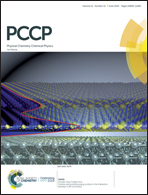Interplay of exciton–excimer dynamics in 9,10-diphenylanthracene nanoaggregates and thin films revealed by time-resolved spectroscopic studies†
Abstract
Anthracene and its derivatives are organic semiconducting materials that have prospective applications in organic solar cells and organic light emitting diodes. A thorough understanding of the photophysics and exciton dynamics is imperative for the effective utilization of these materials in optoelectronics. Herein, we have presented the exciton dynamics of a highly emissive anthracene derivative, namely, 9,10-diphenylanthracene (DPA) in nanoaggregate, thin film and crystalline forms. In contrast to the strong blue molecular emission in solution, DPA in the solid form exhibits emission from both the exciton and excimer state, covering the blue and green spectral region. In the well-ordered crystalline state, excimer emission dominates, while in the nanoaggregate form, the relative contribution of the excimer state decreases with the decrease in the size of the nanoparticle. In crystals, thin films and larger size nanoaggregates, favourable intermolecular orbital overlap by the adjacent phenyl substituents of DPA in the dominant α-phase packing allows for the fast relaxation of the exciton to excimer state in a sub-nanosecond timescale, as measured by time-resolved emission studies. Prior to trapping in the excimer state, the diffusion of singlet excitons has been revealed via the exciton–exciton annihilation kinetics measured by the excitation fluence dependent ultrafast emission decay. The singlet exciton diffusion coefficient in the DPA nanoaggregate is noted to be almost an order of magnitude slower than that in the anthracene nanoaggregate previously reported. The near perpendicular orientation of the two phenyl rings at the 9 and 10 position of anthracene causes an elongation in the intermolecular distance of the anthracene cores, which impedes the exciton diffusion rate. However, the ordered molecular packing of the DPA molecules in the thin film and crystal facilitates significantly faster singlet exciton diffusion.



 Please wait while we load your content...
Please wait while we load your content...